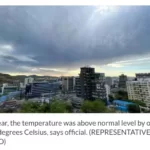At the COP28 conference in Dubai, leaders from nearly 120 nations pledged to triple the world’s renewable energy within seven years. The commitment aims to accelerate the shift away from fossil fuels, a crucial step in achieving net-zero carbon emissions by 2050.
Negotiators brace for challenging discussions on the future of fossil fuels over the next two weeks. Despite positive strides in renewable energy commitments, major oil producers like Saudi Arabia, Russia, and Iran did not join the pledge. Clean power advocates stress the need for regulatory measures to phase out polluting forms of energy.
Leaders at COP28 rallied behind voluntary pledges to triple global renewable capacity and double energy efficiency by 2030. However, notable omissions, including China and major oil producers, highlight the challenges in achieving universal commitment to cleaner energy.
Oil and gas companies, responsible for 40% of global production, including Saudi Aramco and UAE’s ADNOC, pledged to decarbonize their operations by 2050 and reduce methane emissions. Critics argue that these commitments fall short, lacking measures to address emissions from fuel combustions.
The US Environmental Protection Agency announced stricter regulations on methane emissions from the oil and gas industry. Methane, a potent greenhouse gas, contributes significantly to global warming. The move aligns with a broader international effort to curb methane emissions.
While the focus remains on renewables, the US led a call, joined by over 20 nations, to triple nuclear energy capacity by 2050. The controversial move underscores the ongoing debate on the role of nuclear power in a cleaner energy future. Additionally, US Vice President Kamala Harris pledged $3 billion to support developing countries in their energy transition and climate change adaptation.
As COP28 unfolds, the global community grapples with the complex challenges of transitioning to cleaner energy sources and mitigating climate change impacts. The conference’s success hinges on the collaboration of nations, industry stakeholders, and the fulfillment of financial commitments for a sustainable and resilient future.



